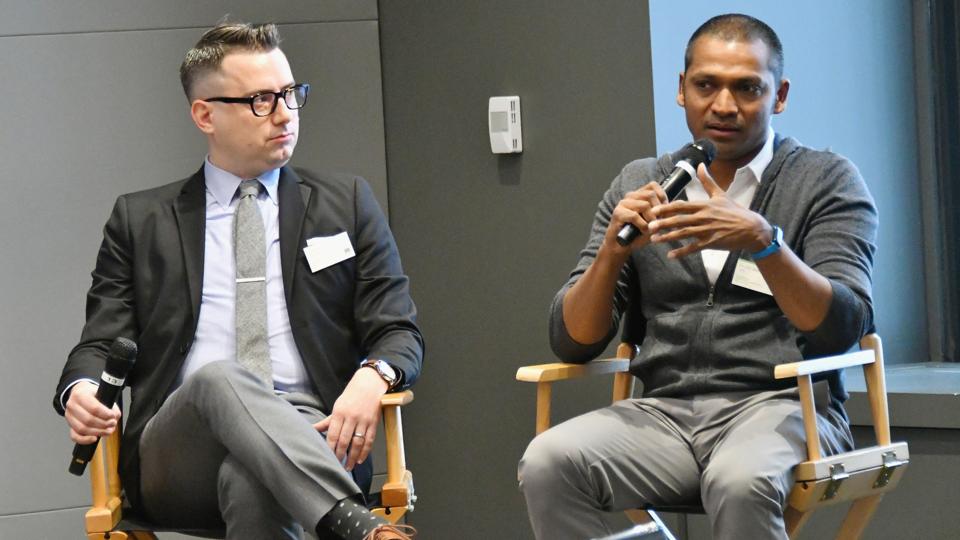
TL; DR. Some people look at the world differently. A software company from New York decided to use this as a competitive advantage. Its staff consists of 75% of testers with autism spectrum disorders. Surprisingly, the things autists needed turned out to be useful for everyone: a flexible schedule, remote work, communication at Slack (instead of personal meetings), a clear agenda for each meeting, rejection of open offices, cancellation of interviews, a career alternative to promotion to a manager, etc.
Rajesh Anandan founded Ultranauts (formerly Ultra Testing) with a dorm roommate at Massachusetts Institute of Technology Art Schektman with one goal: to prove that neurodiversity and employee autism are a competitive advantage in business.
“There are an incredible number of people in the autism spectrum whose talents are ignored for a variety of reasons,” says Anandan. “They are not given an honest chance to succeed at work because of the atmosphere, the work process, and the 'habitual' business practices that are not very effective in principle, and are especially harmful for people with such thinking.”
New York startup in the field of quality engineering is one of many companies that are specifically looking for employees with autism. But programs at companies like Microsoft and EY are limited in scope. They are created purely to support the so-called "minorities." In contrast to them, Ultranauts completely built a business on people with special thinking, began to actively recruit precisely such employees and develop new working methods for the effective management of mixed-type teams.
“We decided to change the standards of all work, the recruitment, training and team management procedures,” Anandan explains.

Right: Rajesh Anandan, founder of Ultranauts, who seeks to prove the value of neurological diversity in the workforce (photo: Getty Images)
The word neurodiversity has recently been used frequently, but it is not a common term. It refers to a number of differences in the functioning of individual functions of the human brain , which may be associated with conditions such as dyslexia, autism, and ADHD.
A study by the National Autistic Society of Great Britain (NAS) found that there is still high unemployment among autistic people in the UK. In a survey of 2,000 respondents, only 16% worked full time , while 77% of the unemployed said they wanted to work.
Barriers to their normal operation are still too high. Richmal Maybank, Employer Relationship Manager at NAS, cites several reasons: “Job descriptions are often tied to standard behavior and fairly general,” she says. “Firms are looking for“ team players ”and“ people with good communication skills, ”but they lack specific information.”
People with autism find it difficult to understand such general formulations. They are also at a loss for some typical interview questions such as “Where do you see yourself in five years?”
In addition, it may be uncomfortable for people to talk about their condition and work in open-plan offices, where they are pressured by the need to communicate and an unacceptable noise level.
Five years later, Ultranauts brought the share of employees with autism spectrum disorders to 75%. This result was achieved, among other things, thanks to an innovative approach to hiring. In other companies, when hiring employees, they often attach great importance to communication skills, which practically excludes people with autism. But Ultranauts has no interviews, and candidates are not presented with a list of specific technical skills: “We have implemented a much more objective approach to selecting candidates,” Anandan says.
Instead of resumes and interviews, potential employees undergo a basic competency assessment, in which they are evaluated according to 25 parameters of a software tester, such as the ability to learn new systems or accept feedback. After the initial tests, potential employees work remotely for one week, this week is paid at full rate. In the future, they can choose to work according to the DTE (desired-time equivalent) schedule, that is, an arbitrary number of working hours: as long as they are comfortable, so as not to become attached to work full time.
“As a result of this selection, we can find talents without any work experience, but who are likely to be very good at it with a 95% probability,” Anandan explains.
Competitive advantages
Research by Harvard University and BIMA has shown that the widest variety of employees who think otherwise has enormous business benefits. It was shown that such employees increase the level of innovation and problem solving, because they see and understand information from different angles. The researchers also found that the specific conditions for these employees, such as flexible hours or remote work, benefit the “neurotypical” staff, that is, everyone else.

French President Emmanuel Macron at a Paris event in 2017 to raise awareness of autism (photo: Getty Images)
Many companies are beginning to realize that a broader view of things gives a competitive advantage, especially outside the IT sector. They turn to the NAS to help recruit employees with autism. NAS recommends starting with small changes, such as providing a clear agenda for each meeting. Agendas and similar tools help employees with perceptions to focus on relevant relevant information and plan things in advance, making meetings more comfortable for everyone.
“What we offer is good practice for any company, and not just for people with autism. These are simple methods that often give quick returns, says Maybank. “Employers should understand the culture and unwritten rules of their organization to help people navigate.”
Maybank has been working with autistic people for ten years. Ideally, she would like to see mandatory training courses for managers and more friendly programs that help to establish social connections at work. She also believes that employers need to provide different career options for people who do not want to become managers.
But she says that neurological diversity has improved the general atmosphere: “Everyone is becoming more open about different areas of autistic and neurodifferentiated behavior,” the specialist explains. - People have a pre-existing opinion of what autism is, but it is always better to ask the person himself. Despite the same condition, people can be completely opposed to each other. "
New technologies
However, this is not just awareness raising. Remote work and new technologies help all other employees for whom the former atmosphere was not the best.
Work tools, including the Slack instant messaging platform and the Trello list compiler, have improved communication for remote employees. At the same time, they provide additional benefits for people with an autistic spectrum if it is difficult for them to communicate personally.
Ultranauts uses these technologies and also creates its own tools for staff.
“A couple of years ago, a colleague joked that it would be nice to see a manual complete with each employee,” recalls the director of the company. - We did just that: now everyone can publish such a self-description called “biodex”. It gives colleagues all the information on the best ways to work with a specific person. ”
The flexible workspace customization and adaptation of the company for autism was a huge success for Ultranauts, which now shares its experience.
It turned out that the introduction of conditions for people with autism did not add any difficulties to other employees and did not reduce the effectiveness of their work, but rather. People who were often ignored before were able to show their true talents: “We are demonstrating again and again ... that we have achieved better results thanks to the diversity of our team,” says Anandan.